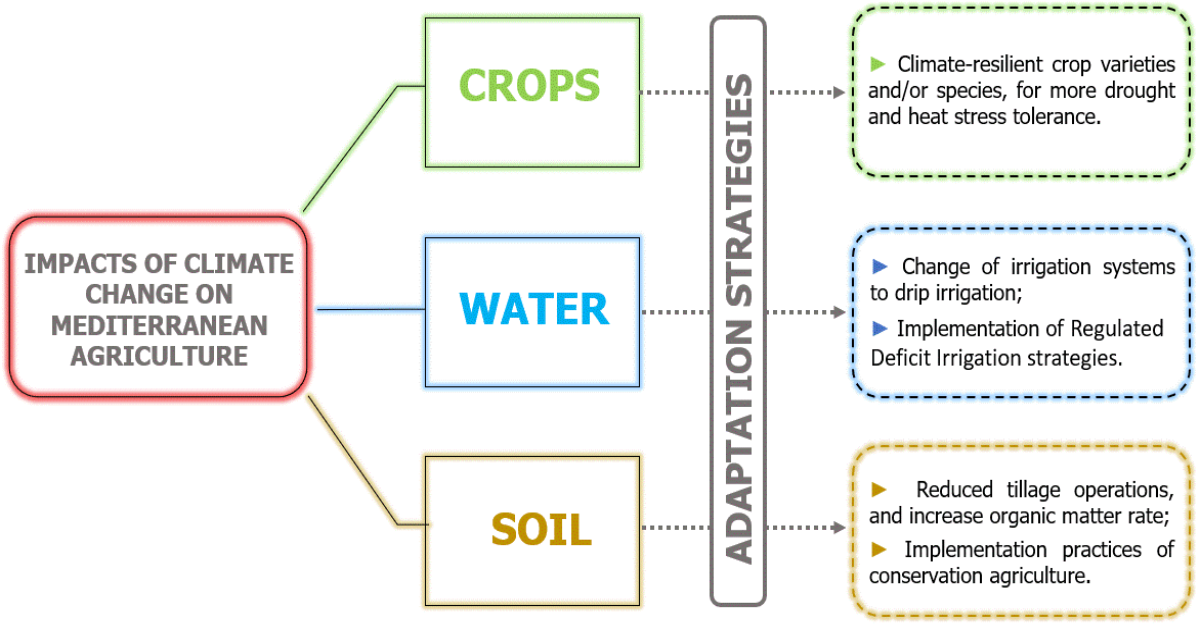Adaptation Strategies Under Climate Change in Mediterranean Agriculture
A special issue of Agronomy (ISSN 2073-4395). This special issue belongs to the section "Farming Sustainability".
Deadline for manuscript submissions: 25 March 2026 | Viewed by 8983

Special Issue Editors
Interests: soil and water conservation; agro-forestry systems; water use in agriculture; hydrology; non-point source pollution at small basin scale
Interests: irrigation systems; water use in agriculture; water resources; decision support systems
Special Issues, Collections and Topics in MDPI journals
Special Issue Information
Dear Colleagues,
Climate change projections for the Mediterranean region predict a significant decrease in rainfall and an increase in temperatures, which could affect around 48% of cultivated areas; this is a faster rate than the global average. The consequences of these changes for food security and natural resources in this region could be very adverse. Anticipating the impacts of climate change by improving the efficiency of agricultural systems is a priority to maintain agricultural systems and acceptable productivity levels in increasingly adverse climatic conditions.
Transformational adaptations in order to face climate change, whether on a farm scale or a larger territorial scale, can be categorized as those requiring more or less time, effort, and system changes. So, the aim and scope of this Special Issue is to invite authors to submit manuscripts on studies or comprehensive reviews on adopting soil, water, and crop-based climate change adaptation practices.
For this Special Issue, manuscripts based on original studies using experimental devices or with the application of informatic tools such as simulation and optimization models or manuscripts with an exhaustive review of the state of knowledge on this topic will be included.
Dr. António Canatário-Duarte
Dr. José Manuel Monteiro Gonçalves
Guest Editors
Manuscript Submission Information
Manuscripts should be submitted online at www.mdpi.com by registering and logging in to this website. Once you are registered, click here to go to the submission form. Manuscripts can be submitted until the deadline. All submissions that pass pre-check are peer-reviewed. Accepted papers will be published continuously in the journal (as soon as accepted) and will be listed together on the special issue website. Research articles, review articles as well as short communications are invited. For planned papers, a title and short abstract (about 250 words) can be sent to the Editorial Office for assessment.
Submitted manuscripts should not have been published previously, nor be under consideration for publication elsewhere (except conference proceedings papers). All manuscripts are thoroughly refereed through a single-blind peer-review process. A guide for authors and other relevant information for submission of manuscripts is available on the Instructions for Authors page. Agronomy is an international peer-reviewed open access semimonthly journal published by MDPI.
Please visit the Instructions for Authors page before submitting a manuscript. The Article Processing Charge (APC) for publication in this open access journal is 2600 CHF (Swiss Francs). Submitted papers should be well formatted and use good English. Authors may use MDPI's English editing service prior to publication or during author revisions.
Keywords
- mediterranean agriculture
- climate change
- crop adaption strategies
- water scarcity
- increase soil conservation
Benefits of Publishing in a Special Issue
- Ease of navigation: Grouping papers by topic helps scholars navigate broad scope journals more efficiently.
- Greater discoverability: Special Issues support the reach and impact of scientific research. Articles in Special Issues are more discoverable and cited more frequently.
- Expansion of research network: Special Issues facilitate connections among authors, fostering scientific collaborations.
- External promotion: Articles in Special Issues are often promoted through the journal's social media, increasing their visibility.
- Reprint: MDPI Books provides the opportunity to republish successful Special Issues in book format, both online and in print.
Further information on MDPI's Special Issue policies can be found here.






